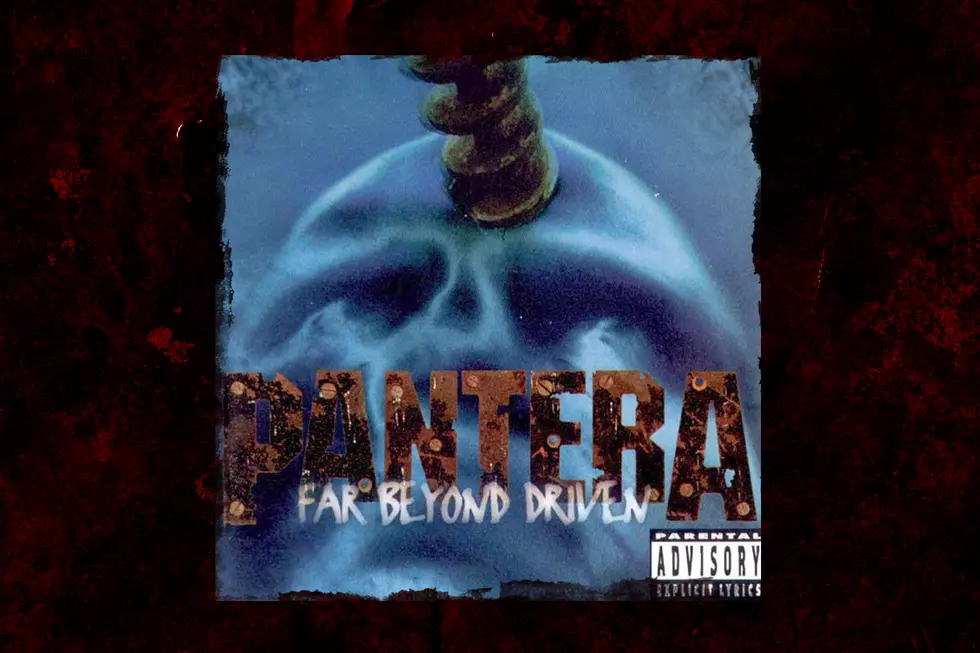
Kill Devil Hill’s Rex Brown Talks ‘Revolution Rise,’ Legacy of Pantera, New Hartke Gear + More
Former Pantera / Down member and current Kill Devil Hill bassist Rex Brown recently stopped by New York for an intimate musical demonstration at a NYC Sam Ash store. Shortly before taking to the makeshift stage with his brand new Hartke gear, we sat down with Rex for an exclusive interview.
As Rex Brown dragged through a couple of cigarettes in the back of the NYC Sam Ash, he spoke with us about his new endeavors with Hartke, Kill Devil Hill's new album 'Revolution Rise,' the legacy of Pantera, the current state of the music industry + much more.
Please enjoy our new interview with low-end legend Rex Brown!
Why is now the right time to switch to Hartke?
I just think it's more the gear they have now, it's more technology friendly for what I want to do. The sound that I’m looking for is more what I want to do. Cabinet wise, each one of those speakers can handle up to 250 watts. The roster; that's not the reason I left [Ampeg]. The reason I left; I don't want to get into it, but the reason that everyone else has left is just … certain things just weren't happening the way we needed them to be done. It was a great f---ing amp company for me, I hated that phone call. You just have to move on, it's life. Things change, you know? That's just the way it works.
These guys [Hartke] came to me and made me a really good offer and a lot of these clinics and stuff like that. I want to be doing more of these. This is also a good push for me because the record ['Revolution Rise'] comes out next month.
I was looking at your amps out there in the store. It looks like a beastly set up.
And that's only half of it.
Wow.
Yeah, it's gonna be f---ing loud. Those amps are like 2000 watts mono-bridge.
Especially for a bass amp. That's huge.
What's cool is that Larry Hartke is here; the guy who developed this whole thing, who developed this speaker. It's funny, I've known Stewart Spector for 20 years and Stewart was telling me a story the other day that he remembers when Larry had a little apartment off of whatever down here [New York City]. Greenwich Village or something like that. He said that Larry was like, 'You've got to come over!' Stewart was just starting out in the business and Larry was just starting out. 'You've got to come out and check this out. You're a bass enthusiast; you've got to come and check out this rig I've got.' So he came over and played through Larry's stuff.
Larry has been going strong for 35 years. Not until they brought this high-drive cabinet out was I ever a big fan. Like I said, I'm still running through. There are so many variables with this amp. You hit the overdrive and it completely changes the structure of the gain, then if you take that off … I've gone from using rack-mount stuff into just stomp boxes; I use my old ones. I'm still using my same wah pedal I used in the fucking 'Reinventing the Steel' tour. Some things still work; you take care of them. As long as the diodes don't go out on them, they're fine.
You're here today at Sam Ash in Manhattan and you're going to be signing autographs for a lot of people. Do you remember the most amount of autographs you signed in one day?
I count that pretty close, because we used to do in-stores and we used to count. We would see how many people would get through at a certain time, so I think we did, in one sitting, our record was 2600 people in two hours and 15 minutes.
That's pretty quick.
That's f---ing rushing them through the door. We had that supply and demand kind of thing, that's the only way you can do it. If not, you're there for days. This is all about just getting to play and getting up here. Pretty much the hardcore fans are the ones that are going to come here, especially the bass players, stuff like that. I'll go to the clubs and it's always another band's bass player … bass players unite. I've said that from the beginning. We always f---ing get together and huddle around asking what we use; 'What's your trick?' It's a community thing. Our fans; I get to spend a little time with them and stuff. That's better than sitting around in a f---ing hotel room, man. I'm planning on doing clinics all across the country on this next run and the next run and then that one and that one and that one.
'Revolution Rise' is Kill Devil Hill's new album. What would you say, if anything, is showcased on this album that maybe Kill Devil Hill didn't get to really represent on the self-titled record?
The self-titled; they'll say, 'Oh, it doesn't sound like Pantera,' but there's only four guys that can make that sound. There’s a bunch of people, and it's very flattering; imitators that want to get that sound and have that, and its very, very cool. At the same time, people need to look at the fact that Pantera is a band that is no more. You can't really go, 'Eh, it's not really Pantera, I'm not going to listen to it.' Well, you still have the musicianship. Down doesn't sound like Pantera. Hellyeah doesn't sound like Pantera. Kill Devil Hill doesn't sound like Pantera. You have four different guys with a chemistry that all blends together. For this, to answer your question, it sounds like Pantera. No! [Laughs]
It's an extenuation of what have before. Playing more gigs, 100 more gigs, 150 more gigs where we [Kill Devil Hill] had only played four or five when we went to record the first record and rehearsing however long and we basically went in there and did that record [self-titled] in 28 days. We took six months with this one. We wrote it in little spurts of three songs at a time -- four here, three here and then it gives you fresh ears so you can come back and go, 'Okay what do we need to do now?' Once it starts taking shape. It's just bigger, better, more.
Last year, we signed with this record label that went out of business three weeks out and dropped the record. It's a great record. If it would have gotten the exposure we might be in a different place, but the way I look at it is how bands used to put out EPs back in the day before they kind of blew the f--- up. Even though there has been material out and we got a little bit of radio play, this one you're gonna hear a lot more of. I'm really proud of this record. I really am. As far as actually putting it together, I don't know if it's the funnest record I’ve ever done, but at the end of the day, it is by far some of the best -- one of my favorite records I've done in a long time.
You mentioned that label shutdown. Luckily, you bounced back and you're on Century Media now.
Yeah and they have the staff for what we're doing.
A lot of musicians that used to be in very prominent bands, when they go on and form different projects or supergroups or whatever you'd like to call it, a lot of the time, they crash and burn and nobody ever hears it. Signing to a label like Century Media, is that a vindication of the band's possible longevity and quality of what you're doing?
I'll tell you what, I told these guys when we signed with them, I said, 'I want some place that I can be part of a family.' Family orientated where I put music out there that I f---ing want to. I want someone to be behind it. Through promotion and self-promotion, us getting out and touring as much as we possibly can; it's a win-win situation. We supply the goods, we expect back-and-forth. We're going to have to tour our asses off on this. That's just one of the deals. The understanding going into it, I wanted to make sure I talked to the president several times and said, 'Are you into doing this? I want to make this a long-term kind of deal.'
These days, the market is so fickle. They bean count what you did on the last record . As I was saying, the last record came out of a business that there was no support for after three weeks or four weeks. These guys stepped up to the plate. I'll put it that way -- Century Media did. They came up with a hell of a marketing plan and just the context. They've come in and loved the record and knew we didn't get the shot we should have gotten in the first place. This is going to be a really good year. I'm excited.
You mentioned this is new album is one of the favorite pieces of your career...
I think people say that all the time, but really, it is. I've done so many records. So many that were successful and some that were not, but were really good records. This one, for me and for the four of us tied together, it's just a great extenuation of what can and will be. The songwriting on this is really good.
Musicians definitely do say that a lot.
If it's not good, I'd tell you. I don't know if I'd tell you if it sucked, but I'm not going to sit here and be so enthusiastic about it. I'd just go through and say, 'Nah, I don't want that interview. I don't want to talk to anyone.' I'm really proud of this record.
Does this part of your career and releasing this record feel like any past part of your career in terms of you being so proud of what you're doing right now?
I see the hunger in what we do. In all actuality, we hadn't been on stage together since we were out with Alice Cooper, which was the last run that we did. I said, 'We don't have any support behind us.' It's hard to get out there and make a living enough to cover expenses, much alone do what you're doing. I'm not doing it for the money, mine's passion. It's not my hobby. I want a fan base. I want to build this thing up.
It's one of those kind of things where you just have to dig down deep, pull your boots up tall and stomp on through it. If you look at ticket sales and everything else that's gone on this year, it's been the worst year in recent history or in a long time. All I can say to that; it's just because there's not any good music out there. The packages they’re putting together, there's nothing really that good. Basically that's what it boils down to. There's a bunch of crap coming out. I've been around long enough to know what's crap and what isn't. I don't put out crap. Never have, never will.
Luckily, metal bands are still packing fans into some pretty big venues.
A lot of these bands that can get out there and do it, they've had longevity. They've changed either members of the band, or people have fallen out, but they still have the brand. That's what I want to do with Kill Devil Hill. I want the brand to be there. In order to do that, you have to continue to tour and make ends meet. You've got to put gas in the tank. I think that’s one thing that, like I was saying, bands putting out EPs. This is maybe our, with the right attention that's going to be drawn to this record, it's kind of like starting over again.
Much like Dimebag was very responsible for a certain groove and tone in Pantera, I think you're also very responsible for a certain groove and tone. Is there any way that you interject groove into Kill Devil Hill that's very noticeably different then that of Pantera or Down?
I don't know. Tough question. Dime had a drive from hell. We all did at a certain point. That's a tough to answer. That's kind of like saying, 'Well, if he were still alive what would he be doing or what would I be doing?' Know what I'm saying? It's hard to answer. All I can say is that I'm giving it 100 percent and giving it my all. That's what we're going to do. My whole thing is about going out and putting a smile on somebody's face with my music. I'm blessed with that, with what I do. I've worked my ass off really hard to achieve the success I had and everything else. There’s no reason not to give back and through this. I think that's where a lot of the hunger comes from too. Just to give back.
It's got to be bad ass. You've been on a big level before … well, you know, these days even if you've had and been in supergroups -- the supergroup tag is so f---ing cliché these days -- it's just a bunch of friends getting together to jam and they put out a record and sometimes it's a hit and sometimes it’s a miss. It depends on the songs, really. If it's good songs I think people will listen to them. And to have the right push behind it, it's visible and it's in the f---ing stores. Or if it's Amazon, on the other label we had, they wouldn't even fill the order. How do you f---ing do that?
That's got to be frustrating.
Very. But, it's just the industry. It's just the way it's come. I'm not saying we're going to break any new rules or anything like that, but you know, its definitely a climate change as far as thinking-wise and trying to think outside of taking the old way and thinking of something new. To think outside of the box also might help. It's turning into a double edge sword.
As a musician, no matter how celebrated you are or how technically good you may get, there are always going to be those people that you put up on a pedestal and you say, 'No matter what I do, what I achieve, I could never be as good as this person.' Who are those people for you?
Oh, I don't know. I don't get stage fright when I meet anybody. Put it this way; I went and saw BB King the other night, two or three weeks back. He's 87 years old. They come out and set him down on the chair. He sits there and talks half the time while the band is playing a little groove behind him. It was just delightful. Then when he started rocking, it was absolutely wonderful. So if that answers your question, I can't think of anything to say other than watching some 87-year-old man still f---ing doing it and enjoys what he's doing and loves the music.
That’s the way it should be. That's it. He was just, you know? Everything he said about the crowd, and 'thank you' and how grateful he was that you still came out to see him. There's great players out there. I'm just who I am today. I'm real confident in what I do. I still have a fire. Until that burns away, we can figure something else out.
Are people still going to see you onstage when you're 87 years old?
I doubt it. Playing this kind of music? I doubt it, but you never know. Look at Willie [Nelson] for God's sake. Take it one day by day. Got to make a master plan and envision that then take it day by day.
Kill Devil Hill's sophomore album 'Revolution Rise' will see an Oct. 29 release date.
More From Loudwire









